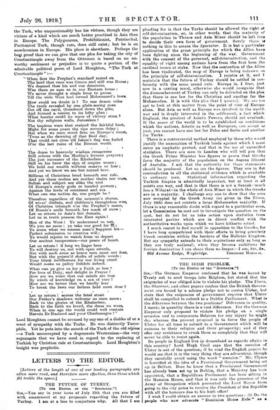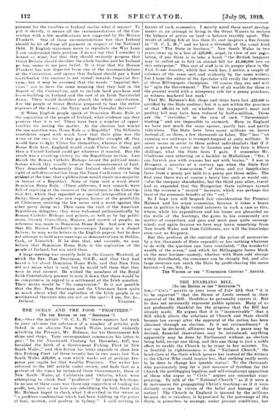THE IRISH PROBLEM.
[To l'HE EDITOR or 22IE SPEOTATOE."1 Sni,—The German Emperor confessed_ that he was bouud by Treaty not to send troops into Belgium, but stated that the exigencies of war obliged him to violate his pledge. The Times, the Observer, and other papers confess that the British Govern- ment are bound by a solemn pledge not to coerce Ulster, but state that the exigencies of government require that Ulster shall be compelled to submit to a Dublin Parliament. What is tho difference between the two positions? Difference in quality, I mean; in quantity there is a vast difference. For the German Emperor only proposed to violate his pledge on a single occasion and to compensate Belgium for any injury he might do; whereas the present proposal is to force the people of Ulster for all time to submit to a Government which will be ruinous to their religion and their prosperity; and if they offer any resistance to crush them so completely that they will never be able to resist again.
Do people in England live in dreamland as regards affairs in this country? Lord Hugh Cecil says that the coercion of Ulster is out of the question; if he read the English papers ho would see that it is the very thing they are advocating, though they carefully avoid using the word "coercion." Mr. Clynes is horrified at the idea of a Provisional Government being set up in Belfast. Does he know that a Provisional Government has already been net up in Dublin, that a Ministry has been appointed, that a Republican Parliament has been sitting in the Mansion House, and that it was only the presence of the Army of Occupation which prevented the Lord Mayor from going to the city gates to receive the President of the Republic with all the honours due to his high office?
I wish I could obtain an answer to two questions: (1) Do the people who now advocate "Dominion Home Rule " as • panacea for the troubles of Ireland realize what it means? To put it shortly, it means all the recommendations of the Con- vention with a few modifications now suggested by Sir Horace Plunkett. One of those recommendations was that Ireland should be let off from all payment in respect of the National Debt. If English statesmen mean to repudiate the War Loan I can understand their position (I do not say that I consider it honest or wise), but that they should seriously propose that Great Britain should shoulder the whole burden and let Ireland go free seems to me past belief. It is true that Sir Horace Phinkett has now departed from one of the recommendations of the Convention, and agrees that Ireland should pay a fixed contribution (the amount is not stated) towards Imperial Ser- vices; but it may be assumed that the words " Imperial Ser- vices" are to have -the same meaning that they bad in the Report of the Convention, and to include land purchase and Louse-building in Ireland and the cost of an Irish Territorial Army. These would doubtless absorb the whole contribution. A re the people of Great Britain prepared to bear the entire expenses of the Army, the Navy, and the Consular Services?
12) When English people speak of Dominion Home Rule as the aspiration of the people of Ireland, what evidence can they produce that it is so? There have been a number of oppor- tunities fol. .testing the matter. At the election last. winter the one question was, Home Rule or a Republic? The Dillonite candidates urged with much force that their plan was the wiser of the two; for if they got a Republic straight off, they would have to fight Ulster for themselves, whereas if they got 'tome Rule first, England would crush Ulster for them, and then a United Ireland could get whatever it wanted. But the result was a crushing victory for the Republican section. Last March the Roman Catholic Bishops issued the political mani- festoes which they usually issue at the commencement of Lent. They demanded vehemently that Ireland should obtain the right of self-determination from the Peace Conference (it being evident at the time that a plebiscitum would result in a majority in favour of a Republic). None of them said a word about Dominion Home Rule. (These addresses, I may remark, were full of rejoicing at the success of the resistance to the Conscrip- tion Act, which they regarded as a. special interposition of the Deity; those .people who now express horror at the possibility ef Ulstermen resisting the law never said a word against the ether party doing so.) Then came the visit of the American Republican delegates; they were welcomed enthusiastically by Reiman Catholic Bishops and priests, as well as by lay politi- cians, County Councillors, Mayors, and crowds of people; no reference was made to Dominion Home Rule. And now we see that Sir Horace Plunkett's microscopic League is a dismal failure; he may write letters to the English papers, but he does not attempt to hold mass meetings or demonstrations in Dublin, Cork, or Limerick. If he does that, and succeeds, we may believe that Dominion Home Rule is the aspiration of the people of Ireland, but not until then.
A large meeting was recently held in the County Wexford, at which the Rev. Dom Sweetman, 0.S.B., said that they had beard a lot about Dominion Home Rule, and that Sinn Fein slid not mean what it said, but he would tell them that they were in real earnest. He wished the members of the Royal Irish Constabulary present to note it down that there would be wo compromise in regard to a settlement of the Irish question. Their motto would he "No compromise." Is it not possible that the Rev. Dom Sweetman and the 'Ulstermen know quite as much about what the aspiration of the Irish people is as sentimental theorists who are not on the spot?—I am, Sir, &c.,



































 Previous page
Previous page